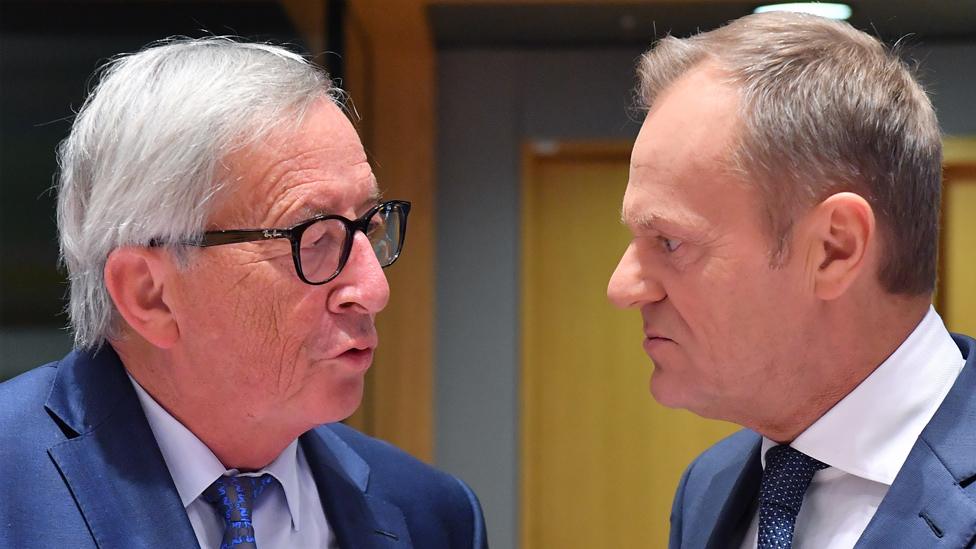EU summit: Leaders suspend talks amid disagreement over top jobs
- Published
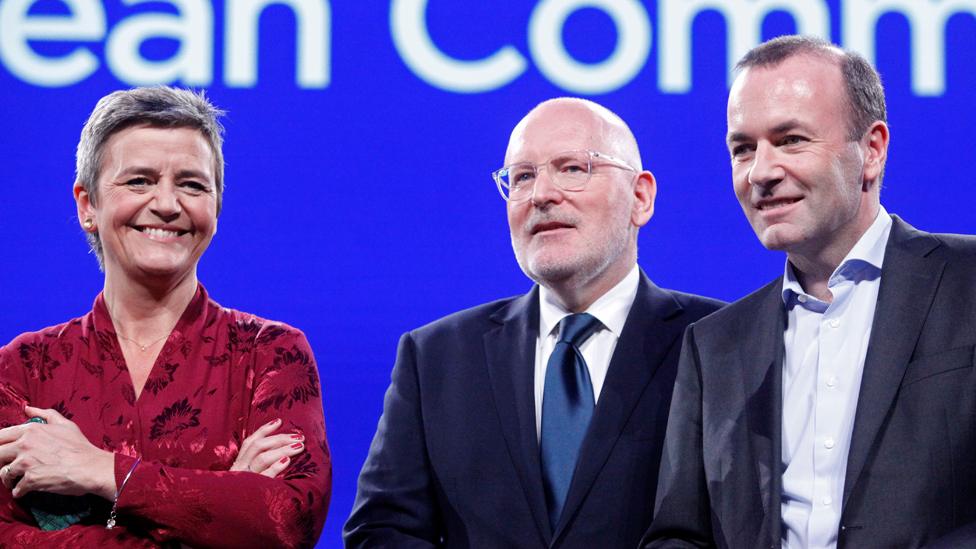
Rivals for the presidency, Margrethe Vestager (liberal, Danish); Frans Timmermans (centre-left, Dutch); Manfred Weber (centre-right, German)
EU leaders meeting in Brussels remain divided over who should get the EU's top jobs, and talks have been suspended until Tuesday.
They are arguing mainly over a successor to Commission President Jean-Claude Juncker. They had hoped to get a deal on Sunday night.
Diplomats say summit chair Donald Tusk proposed Dutch centre-left politician Frans Timmermans to succeed Mr Juncker.
Centre-right Bulgarian Kristalina Georgieva would replace Mr Tusk.
Late on Sunday the summit was suspended so that Mr Tusk could hold bilateral talks, seeking a breakthrough. Talks then resumed over breakfast on Monday but were later suspended until 11:00 (09:00 GMT) Tuesday.
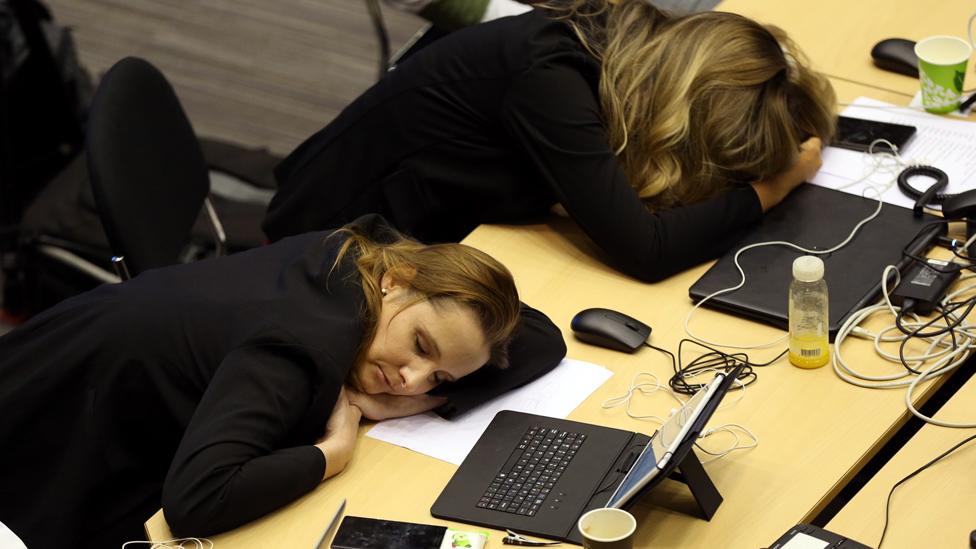
The talks went on late into the night, testing the stamina of journalists
Both German Chancellor Angela Merkel and French President Emmanuel Macron said choosing the candidates was now more complicated because the May European elections had ended the traditional centre-left and centre-right dominance of EU politics.
"When you have not just two partners, but three or four, the issue is not clearly defined," Mrs Merkel told reporters, admitting that the disagreement "looks bad". "But a compromise must be found - historically it's immaterial if this takes a bit longer."
The May elections saw big gains for the liberals - including Mr Macron's alliance - and Greens, as well as for nationalists. But no group has a majority.
President Macron told reporters: "we must learn from this setback - we're projecting an image of Europe which isn't serious, and we need better preparation for these meetings". He lamented that "what's lacking is a feeling and duty to defend Europe as a whole".
What compromise was put forward?
The rare Sunday summit was called because EU leaders failed on 20 June to agree on candidates for the Commission president's job and other top posts: European Council president (to replace Donald Tusk); High Representative for foreign policy (to replace Federica Mogherini); European Parliament president and European Central Bank president.
Latvian PM Krisjanis Karins calls for national and gender balance
Ms Georgieva was proposed to succeed Mr Tusk. She is an economist and ex-EU Commissioner, who has been chief executive of the World Bank since 2017.
Mr Juncker's successor to run the Commission will be responsible for proposing new EU laws, enforcing the bloc's rules and handling trade deals.
But Mr Timmermans, currently a deputy to Mr Juncker, faces stiff opposition from eastern European states and centre-right leaders from the EU's biggest political group, the European People's Party (EPP).
In the proposed compromise, the EPP's candidate to head the Commission, Germany's Manfred Weber, would instead become European Parliament president. He might split the five-year term with liberal leader Guy Verhofstadt.
The deal would put a liberal in charge of EU foreign policy, either Danish EU Commissioner Margrethe Vestager or Belgian Prime Minister Charles Michel.
All of the EU's top jobs are changing hands this year, after the May elections.

Hours of haggling - can it go on like this?
The BBC's Adam Fleming in Brussels writes:
The first priority for EU leaders (and reporters) is to get some sleep after more than 17 hours of debating, haggling, guessing, fighting and fruitlessly searching for compromise.
The next is to agree a package of candidates for the top jobs before the European Parliament presses ahead and elects its president on Wednesday, which would reduce the national leaders' room for manoeuvre, by allocating one of the prizes.
Of course the deadlock will be broken at some point - there will be a candidate for the job of Commission president eventually, and it probably won't even be a surprise. Old hands say this is nothing new.
But plenty of people have started to ask whether this way of making decisions is sustainable, in a fragmented EU where no single person, party, institution or ideology has the power to make things happen.

Why this political wrangling?
The choices have to take account of the elections and achieve an acceptable balance regarding large and small states, gender and geography.
The European Parliament wants the leaders to stick to the "Spitzenkandidat" (lead candidate) procedure launched in 2014, under which those nominated by the most successful parties in the elections get the top posts.
But President Macron is among those opposing the EPP's Manfred Weber and the "Spitzenkandidat" process.
Who's in the running for Juncker's post and other EU top jobs?
Politicians in Poland, Hungary and Romania meanwhile dislike the way Mr Timmermans, a veteran of Brussels politics, has enforced the EU rule of law policy.
Hungary's government spokesman Zoltan Kovacs tweeted, external that appointing Mr Timmermans to the top EU job was "completely unacceptable".
The top EU appointments - especially for Commission chief - sharpen not only national rivalries but also those between the European Council and the European Parliament, which is the only directly elected EU institution.
Mr Macron stressed the need to nominate two men and two women for the four key posts. The fifth - parliament president - is mainly in the hands of MEPs.
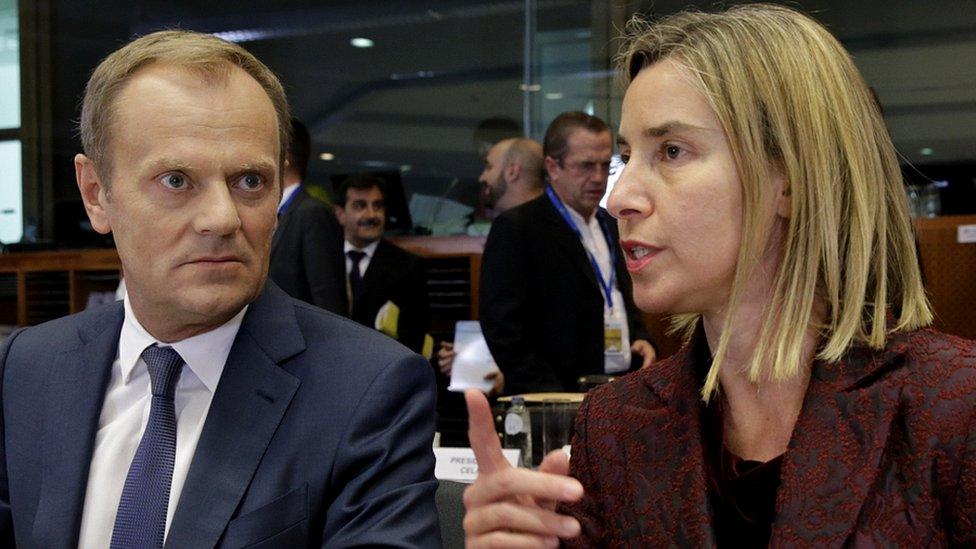
The EU's Donald Tusk and Federica Mogherini will both have left by December
How are the posts decided and what do they do?
The EU treaties say the government leaders - the European Council - have to nominate a Commission president, then MEPs vote on that candidate.
The choice is made by qualified majority - that is:
if 72% of member states vote in favour (21 out of the 28)
and those states represent at least 65% of the total EU population
The pressure is on: at their 15-18 July session, MEPs are to vote on the EU leaders' nominee, who is to take office on 1 November.
The European Council president is to be elected by the EU leaders by qualified majority, and should take office on 1 December. He/she chairs EU summits and steers the bloc's broad strategy, while the Commission deals with the fine details.
The High Representative for foreign policy runs the EU External Action Service (EEAS), dealing with major challenges such as Iran's nuclear programme, Kosovo and EU interventions in Africa.
A favourite to become ECB president, taking over from Mario Draghi, is Jens Weidmann, head of the German Bundesbank. The ECB had to calm markets during the eurozone crisis and manage Greece's severe debt problems. The bank has enormous influence, given continuing concern about the euro.
The European Parliament president steers MEPs' debates and their votes on most EU legislation.
- Published29 June 2019
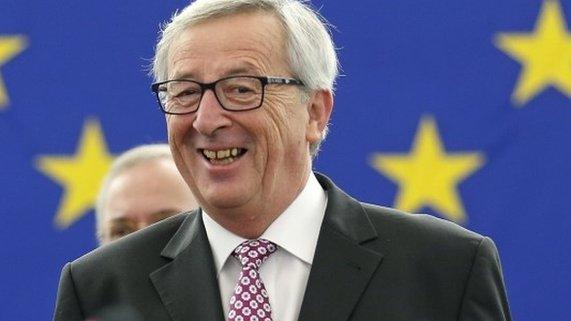
- Published2 July 2019
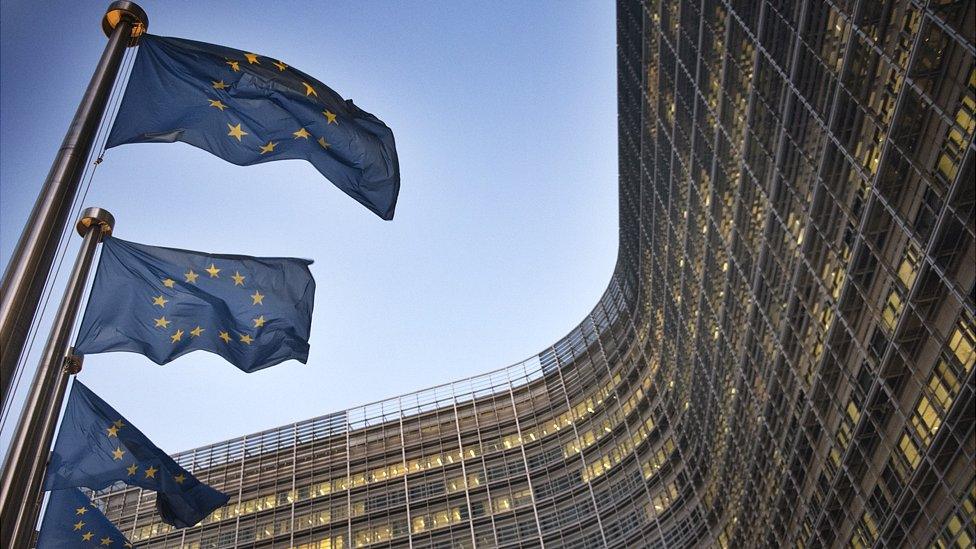
- Published21 June 2019
